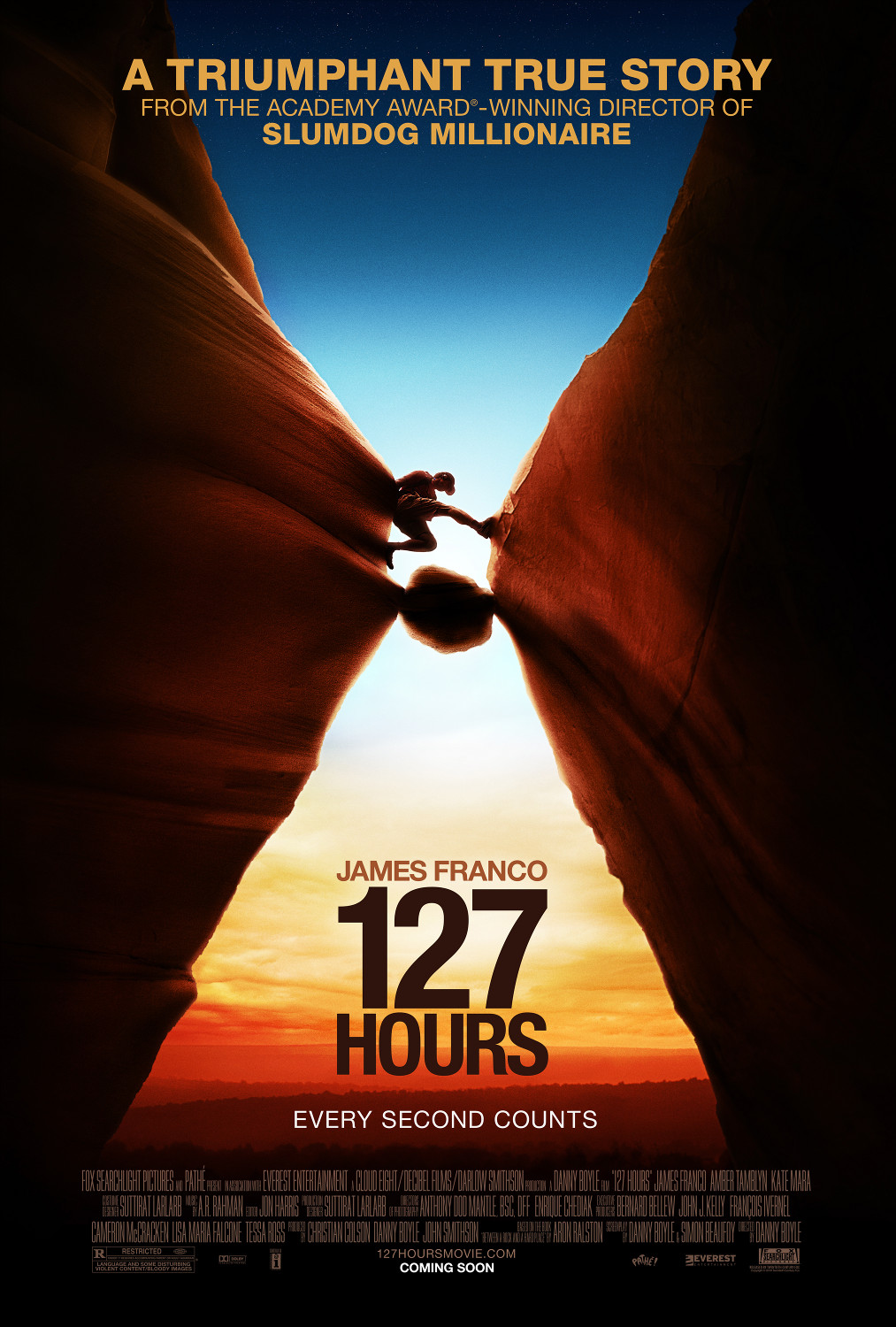127 Hours
 127 Hours Directed by: Danny Boyle Cast: James Franco, Kate Mara, Amber Tamblyn Running Time: 1 hr 40 mins Rating: R Release Date: November 12, 2010 (Chicago)
127 Hours Directed by: Danny Boyle Cast: James Franco, Kate Mara, Amber Tamblyn Running Time: 1 hr 40 mins Rating: R Release Date: November 12, 2010 (Chicago)
PLOT: The story of American hiker Aron Ralston (James Franco) and his fight to survive after his hand is pinned to a rock in the middle of nowhere.
WHO'S IT FOR? Adventurers of the outdoors will enjoy the heroic presentation of American bad-ass Aron Ralston, even if they are fully familiar with the story's events. The tension of the film is open to all, not just those who share Ralston's hobbies or love for adrenaline at all costs.
EXPECTATIONS: Oscar-winning director Danny Boyle returns from his winning Slumdog Millionaire with a film that has James Franco as its sole engine. Would Boyle's energy from his past films translate well into a story of survival in a small space? In general, is there any chance that would this be even better than Slumdog Millionaire?
SCORECARD (0-10)
ACTORS:
James Franco as Aron Ralston: Franco adds great charisma to the stagnant character, bouncing between multiple emotions with the audience in his full control. His unique sense of humor, which becomes progressively darker and more self-loathing, is revealed especially during some magnetic emotionally challenging monologues. Franco is great to watch when painting with all colors of his emotional pallet, however slightly difficult his character may be. Score: 7
TALKING: Ralston’s amazing battery life on his hand-held camera allows him to update us intimately with his current state. Especially when he starts to go a little bit bonkers, the brief videos become a striking documentation of the thoughts that are slamming around inside his head. Score: 6
SIGHTS: With Boyle’s very specific camera angles, we get inside Ralston’s head, and his gear. We climb and we squeeze with him as we traverse through the landscape, (which is also covered with beautiful wide shots), and we understand his utensils because we see inside them (such as his water bottle). The hallucinations that drive the second half of the movie change this relation we have with the visuals, and also keep his more company than they should (more on that below). As for the bloody nature of 127 Hours - yes, it’s graphic, but not to a pulpy point. It seems to accurately capture the horrific situation Ralston had to face, however cringe-worthy or slightly disturbing it may be. Score: 7
SOUNDS: Fuzz guitars and heavy drums pump the film's adrenaline in the opening sequences, introducing a sound scape that will be both loud and unique to its environment. An uplifting song from soulful Icelandic group Sigur Ros is used effectively to give the events of 127 Hours their emotional climax. During the credits, singer Dido performs a slightly inspirational tune co-written by A.R Rahman called “If I Rise.” As for Boyle’s sound design, he uses a wide pallet of sounds that are both fitting and opposing to the film’s realism. Score: 7
PLOT SPOILERS
BEST SCENE: Ralston’s "TV appearance" feels like a familiar scenario, but it is still hauntingly comic with the help of Franco’s charismatic performance. It is also one of the only hallucinations that really strikes the nerves of its audience.
ENDING: All I can say here is that Ralston did write a book about his experience.
QUESTIONS: Read my interview with director Danny Boyle here. I also think that it's strange that the poster for the film depicts Ralston's crisis in a clearly different way.
REWATCHABILITY: A second visit would help make more sense of Franco’s performance, and also to the methods that Boyle uses to create tension in such a small space. Knowing how the story ended didn’t ruin the first viewing, so this wouldn’t be the case with a second viewing.
OVERALL
If anyone should ever have to be picked to defeat nature by being trapped to a boulder, the person would be Aron Ralston. Before the beginning of his predicament, his invincible attitude flourishes from positive to near egotistical. When he takes a tumble on his bike in the beginning of his journey, he laughs it off, and records this defiance with his camera. Midway through the film, when he does get stuck under that stubborn rock, we start to breathe a little too easily once we understand that Ralston is incredibly resourceful. As things progress, some pain seems more understated than others, not just from a medical standpoint, but from the simple position that this hiking master can overcome his body if need be. Boyle's interpretation of these events is often filled with great spirit, but he loads his envisioning of events with too many hallucinations. An essential fear to this story, isolation, is lost by consistent visions that keep its audience a bit too much company. The film presents what Ralston may have been thinking, but we're not exactly connected to what he was really feeling. Instead of this feeling like a trip to undeniable hell and back, 127 Hours echoes something more of a nightmare. Or even more crudely, it feels like the ultimate test of survival catered for the ultimate adrenaline junkie.
127 Hours bookends its experience with international rallies, something possibly meant to present life as a celebration. But in too many instances, the film's biggest message seems to be reduced to a life-or-death urgency of the buddy system.
FINAL SCORE: 7/10